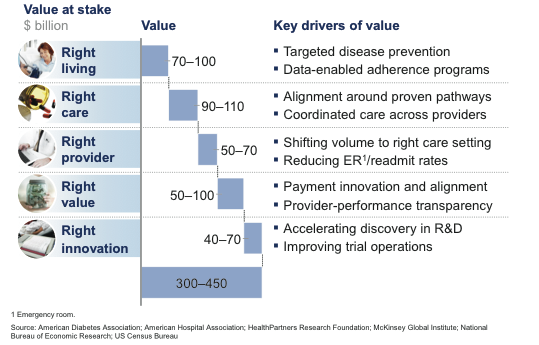5 Ways Big Data Can Change Healthcare: The Latest from McKinsey
McKinsey & Company recently released The Big Data Revolution in Healthcare: Accelerating Value and Innovation, a white paper examining the impact of data and analytics on the healthcare sector. Why big data?
Fiscal concerns, perhaps more than any other factor, are driving the demand for big-data applications. After more than 20 years of steady increases, health-care expenses now represent 17.6 percent of GDP—nearly $600 billion more than the expected benchmark for a nation of the United States’s size and wealth. (source)
The report outlines five ways data will enable the healthcare industry to cut costs and improve quality.
- Right living. Data can help patients to take an active role in their own health, not only treating and managing their current conditions, but also preventing future ones. Consumers must be empowered through lifestyle choices – such as diet, exercise, and medication adherence – to take control of their health.
- Right care. Appropriate integration and application of big data tools will promote evidence-based care that is personalized to the specific patient. Ideally, all care providers could have the same information about a given patient and are working toward a similar goal. Data can improve outcomes, reducing medical errors.
- Right provider. Data can help us better match the provider’s skill set with the needs of the patient and allow assessment of specific providers and their proven outcomes for patients to receive the best medical care.
- Right value. Big data will be used to ensure cost-effectiveness of healthcare through different methods, such as patient-outcome reimbursement and eliminating fraud, waste, and abuse in the system.
- Right innovation. Data will be used to improve innovation not only through specific therapies and care delivery, but also by increasing efficiency and effectiveness of the “innovation engines” themselves. Utilizing data from past trials as well as analyzing trends from current data, innovators will be able to address all aspects of therapeutic innovation – discovery, development, and safety.
The paper models a 300-450 billion dollar reduction in U.S. healthcare costs via big data interventions in each of these pathways.
Read a summary analysis of the white paper here.

